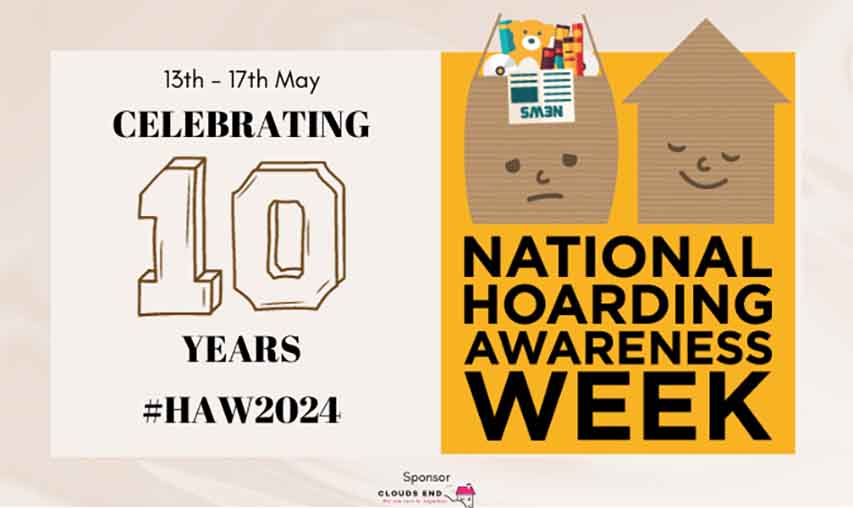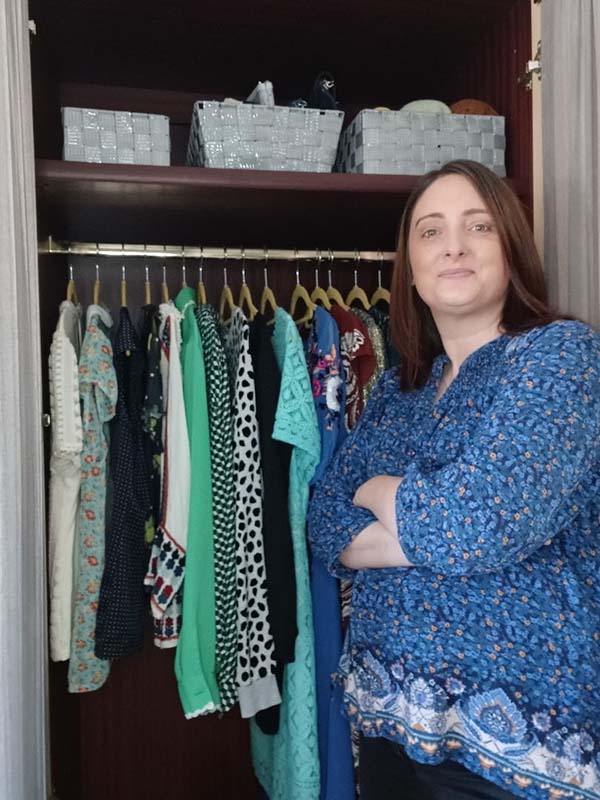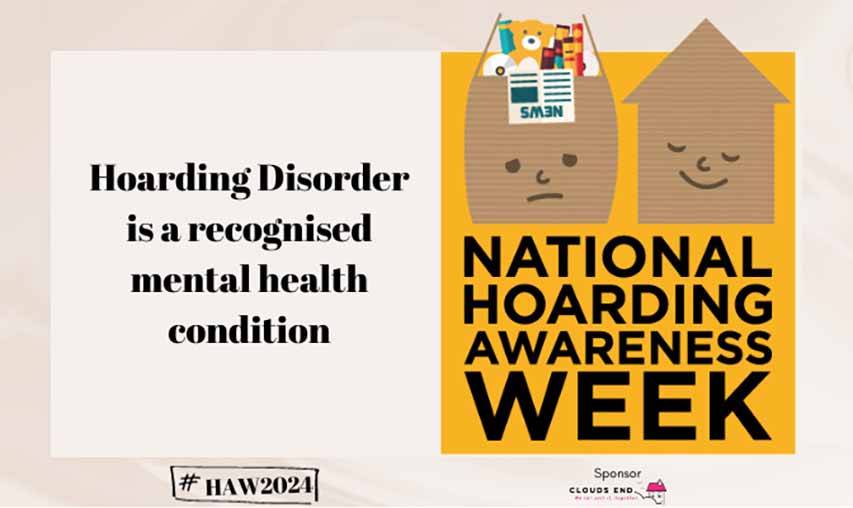Catherine Hamilton from Crossgar backs Hoarding Awareness and Mental Health Week
The coming together of National Hoarding Awareness Week and Mental Health Awareness Week presents a unique opportunity to shed light on the relationship between mental health and hoarding disorder.
Mental health issues affect a significant portion of the population in Northern Ireland, with one in five individuals potentially experiencing problems.
This statistic underscores the pervasive nature of mental health challenges and emphasises the importance of raising awareness and reducing stigma surrounding these issues.
Many people who struggle with mental health may face barriers to seeking help due to societal stigma and feelings of shame, highlighting the need for destigmatisation and increased support.
Hoarding disorder, recognised as a mental health disorder in the DSM-V, a tool used by the American Psychiatric Association, affects a smaller but still significant percentage of the population, with 2-5% of the UK population estimated to hoard.

Hoarding involves the excessive accumulation of possessions, often resulting in cluttered living spaces that can impair daily functioning and quality of life.
While hoarding behaviours can manifest differently from person to person, it is important to recognise that hoarding is not just a lifestyle choice.
It is on the other hand a complex psychological condition that requires understanding and appropriate intervention.
The overlap of Hoarding Awareness Week and Mental Health Awareness Week provides an opportunity to address misconceptions surrounding hoarding disorder and emphasise its classification as a mental health issue.
By raising awareness about hoarding disorder within the context of broader mental health discussions, we can promote understanding, empathy, and access to resources for individuals struggling with this condition.
Additionally, this convergence underscores the interconnectedness of various mental health challenges and the importance of holistic approaches to mental well-being.
Through education, advocacy, and support, we can work towards fostering a more inclusive and compassionate society for all individuals affected by mental health disorders, including hoarding.
Declutterbird Offers Support For Those Affected By Hoarding
When you’re ready to begin the journey of decluttering and organising your home, Catherine Hamilton-Cooper from Declutterbird is a trusted Northern Ireland expert who can guide you through the process with compassion, sensitivity, and patience.
As a certified Institute for Challenging Disorganisation Level 2 Hoarding Specialist, Catherine possesses the specialised knowledge and skills necessary to support individuals struggling with hoarding behaviours practically in their home.
Catherine said: I understand that decluttering can be a daunting and emotionally challenging endeavour, particularly for those dealing with hoarding tendencies.
“That’s why I approach my work with empathy and respect, ensuring that you feel supported and empowered throughout the process.
“With my guidance and support, you’ll remain in control at all times, setting the pace of the decluttering journey.”

Catherine’s goal is to create a safe, manageable, and comfortable living environment that reflects your unique needs and preferences.
By working collaboratively with you, she helps identify practical solutions for organising your belongings in a way that enhances functionality and promotes a sense of well-being.
And with Catherine’s expertise and guidance, you can embark on a transformative journey toward a less full home that fosters peace of mind and enhances your overall quality of life.
Don’t hesitate to reach out to Declutterbird when you’re ready to take the first step toward creating a space that truly feels like home.
Website – www.declutterbird.co.uk
Email – info@declutterbird.co.uk
Phone – 07889472730.
The characteristics of Hoarding Disorder:
The diagnostic criteria of the DSM-5, set by the American Psychiatric Association, says that Hoarding Disorder is:
- Persistent difficulty discarding or parting with possessions, regardless of their actual value.
- difficult due to a perceived need to save the items and to distress associated with discarding them.
- The difficulty discarding possessions results in the accumulation of possessions that congest and clutter active living areas and substantially compromises their intended use. If living areas are uncluttered, it is only because of the interventions of third parties (e.g., family members, cleaners, authorities).
- The hoarding causes clinically significant distress or impairment in social, occupational, or other important areas of functioning (including maintaining a safe environment for self and others).
- The hoarding is not attributable to another medical condition (e.g., brain injury, cerebrovascular disease, Prader-Willi syndrome).
- The hoarding is not better explained by the symptoms of another mental disorder (e.g., obsessions in obsessive-compulsive disorder, decreased energy in major depressive disorder, delusions in schizophrenia or another psychotic disorder, cognitive deficits in major neurocognitive disorder, restricted interests in autism spectrum disorder).
Hoarding and collecting represent distinct behaviours with different underlying motivations and outcomes.
Collectors typically curate their possessions with care, maintaining them in good condition and often showcasing them proudly. Their collections are usually organised and do not interfere with the functionality of their living space.
On the other hand, hoarding can stem from various triggers, including experiences of loss, trauma, or significant life events. Unlike collecting, hoarding is not a deliberate choice but rather a manifestation of underlying psychological distress.
Understanding this crucial distinction is essential in responding to hoarding behaviours with compassion, empathy, and appropriate professional support.
When someone is struggling with hoarding, the effects extend beyond the individual to impact their entire family dynamic.

Hoarded homes can become hazardous environments, posing serious health and safety risks to occupants. The accumulation of clutter and debris can impede movement and increase the likelihood of accidents or fires.
Moreover, hoarding can negatively affect various aspects of an individual’s life, including their work, relationships, family dynamics, and overall well-being.
The stress and tension resulting from hoarding behaviours can strain familial relationships, leading to arguments, resentment, and emotional distress.
Addressing hoarding requires a multifaceted approach that combines understanding, patience, and professional intervention.
By providing support and resources tailored to the individual’s needs, it is possible to mitigate the harmful effects of hoarding and promote a healthier, safer living environment for all involved.
If you or someone you know has hoarding behaviours, seeking support from a healthcare professional is a crucial first step toward addressing the issue.
Your General Practitioner (GP) can provide valuable guidance and connect you with appropriate resources and interventions to address hoarding disorder effectively.
To initiate this conversation with your GP or health professional, an ice-breaker document is available on the following website:
https://hoardingawarenessweek.org.uk/resources/ .
This document serves as a practical tool to assist you in articulating your concerns and experiences related to hoarding in a clear and constructive manner.
Initiating dialogue with your GP or health professional about hoarding can be a pivotal step toward accessing the support and assistance you need.
Whether you’re seeking advice, information, or referrals to specialised services, your healthcare provider can offer invaluable support and guide you toward effective strategies for managing hoarding behaviours and improving your overall well-being
Cognitive Behavioural Therapy (CBT) is widely recognised as one of the most effective treatments for hoarding disorder. It focuses on changing unhelpful thought patterns and behaviours associated with hoarding, helping individuals develop healthier coping mechanisms and skills to manage their symptoms.
Eva McAlea from Empower Counselling is a qualified and experienced BACP Accredited Counsellor, Cognitive Behavioural Therapist, and Fully Qualified Level 2 Breath Coach, offers specialised support for individuals struggling with hoarding behaviours.
Located in the tranquil countryside just outside Castlewellan, Co. Down, Eva provides a serene and nurturing environment conducive to healing and growth.
If you’re ready to take the first step toward overcoming hoarding and reclaiming control of your life, reaching out to Eva could be the beginning of your journey to recovery.
Eva’s expertise in CBT equips her to tailor treatment plans to meet your unique needs and challenges, guiding you through evidence-based techniques proven to be effective in managing hoarding behaviours.
By working collaboratively with Eva, you’ll have the opportunity to explore the underlying factors contributing to your hoarding tendencies and develop practical strategies to address them.
Eva’s compassionate and client-centred approach ensures that you feel supported and empowered throughout the therapeutic process, fostering a safe space for self-exploration and personal growth.
If you’re ready to embark on a path toward healing and transformation, Eva is offering a free 60 min assessment for Declutterbird clients that would benefit from her support.
Together, you can overcome the challenges of hoarding and build a life characterised by greater clarity, freedom, and well-being.
Website – https://empowerconselling.wordpress.com/
Email – Empower@post.com
Phone – 07793 005815 or 028 437 72835.

























